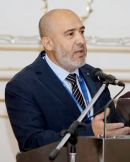 | Maronites Implore Pope Leo: Reform Our Church
| | |  | "I look forward to a positive and constructive meeting with President Trump”- PM Anthony Albanese said .
| | |  | Scholarship Dinner Sydney University
| | |  | Education Minister Jason Clare said teachers and principals had informed authorities that the current mathematics program was too complex.
| | |  | My Home, My Home!
| | |  | Donna Davis, MP said: “This milestone is ... the most significant mental health infrastructure projects in the State's history.
| | |  | Trump highlights daughter Ivanka's marriage to Jared Kushner in speech to Israeli parliament on Gaza peace.
| | |  | Zaiter: "If we want to continue to grow our economy and ensure business prosperity, we need to understand how we can... improve efficiency and stimulate the local economy."
| | |  | “While snakes are part of the local environment, the safest approach is to leave them alone,...” Mayor Mannoun said
| | |  | City of Parramatta Mayor Martin Zaiter thanked Ms. Connolly for her contributions to the City of Parramatta.
| | |  | “And if I have to burn down Parliament House to make a point, I am not there to make friends,” Ms Thorpe said.
| | |  | “This ceasefire, if honoured, may bring a desperately needed halt to the killing, but it is not peace,” said AFIC President Dr Rateb Jneid.
| | | |
|
|
| Maronites Implore Pope Leo: Reform Our Church |
|
Maronites Implore Pope Leo: Reform Our Church
By Elie Hajj | Tuesday, October 21, 2025
Rising Hopes Ahead of the Pope’s Visit
21/10/2025
(See translation in Arabic section)
Sydney-Middle East Times Int'l: Optimism is building within Lebanon’s Maronite Church ahead of Pope Leo XIV’s two-day visit in late November, his first overseas pastoral trip since being elected. The visit comes at a moment many describe as a “spiritual crossroads” between the reformist vision of the late Pope Francis and the entrenched structures of Lebanon’s local Church.
Pope Francis long wanted to visit Lebanon, but illness and political instability prevented it. His successor is now set to fulfill that wish, rekindling hope for long-delayed reform in a Church many see as in need of a serious reckoning.
Still, expectations remain cautious. Some Church insiders warn that reform hopes could again give way to disappointment if change is limited to words and ceremonies.
Observers say successive popes have struggled to align the Lebanese Church with global Catholic direction, largely due to the tight grip of local leaders and their well-established networks of influence.
The “Labyrinths of Complaints”
For decades, Vatican officials largely avoided intervening in the internal affairs of the Lebanese Church. One Vatican insider recalled a cardinal once pointing to a wall of filing drawers and saying, “They’re filled with complaints from Maronites against other Maronites. I won’t go near those labyrinths.”
That began to change in 2013, when Argentine Cardinal Jorge Mario Bergoglio became Pope Francis. Taking his name from Saint Francis of Assisi, the champion of the poor, he called for a humble, service-oriented Church devoted to peace and justice.
At the time, Patriarch Bechara al-Rahi, elected in 2011 under the slogan “Communion and Love,” had already launched a series of committees and initiatives. Yet, despite the global energy of Francis’s papacy, Lebanon’s Church hierarchy failed to fully embrace his message.
Many Lebanese priests and bishops appeared to modify their public behaviour only when in Rome. As one insider put it, “They bet on time, suffering now, but relief later.”
Within Church circles, it was whispered that when Pope Francis condemned clerical luxury and moral complacency, his words were directed partly at Lebanon’s own leaders accused of choosing “between the worship of God and the worship of money.”
Luxury, Power, and the “Temple Thieves”
Lebanon’s economic collapse has hardened public anger toward clerics accused of living in privilege while citizens struggle. Critics point to sprawling villas, luxury cars, private jet travel, and close ties with political and banking elites.
The Maronite Patriarch drew particular ire for defending former Central Bank Governor Riad Salameh and several bank owners, figures widely blamed for the financial crisis that wiped out ordinary families’ savings.
Church leaders, critics say, have grown too comfortable with the powerful and the wealthy. While no one expects modern clergy to live in total poverty, the contrast between the Church’s message and the lifestyles of some of its leaders has become impossible to ignore.
In parishes across the country, it’s now common to hear frustration that the Maronite Patriarchate and its associates favour the rich, while poorer families are being left behind.
Catholic Schools and the Forgotten Spirit of Louaizeh
That sentiment has deepened as many families struggle to afford tuition at Catholic schools, which now demand payment in U.S. dollars. Parents who can’t pay are told to send their children to public schools, a sharp departure from the Church’s traditional commitment to education.
Patriarch al-Rahi and school administrators argue that education is ultimately the state’s responsibility, not the Church’s. But this logic contrasts sharply with the actions of Syriac Catholic Patriarch Ignatius Joseph III Younan, who recently ordered free education for all children in his community, even extending the policy to some Orthodox families.
It also contradicts the proud legacy of the 1736 Louaizeh Council, which established compulsory and free education for boys and girls, 53 years before the French Revolution. That landmark reform helped the Maronites rise in politics, commerce, and scholarship across the region.
Today, critics say, the Maronite Church laments youth emigration but offers little to keep young people in Lebanon. They argue it could mobilize its vast assets to fund education, healthcare, and housing, reviving the vision of Louaizeh, instead of relying on the generosity of the rich.
The Church as a Power Player
Lebanon’s Christian institutions are not just religious entities; they are also major economic actors. The Church owns vast tracts of land, 670 Catholic monasteries, and employs roughly 22,000 people, including 15,000 educators across more than 250 schools. Before Lebanon’s crises, that number exceeded 360.
Its universities, including Saint Joseph, Kaslik, Louaize, Antonine, and La Sagesse, educate more than 35,000 students. Such reach gives the Church enormous social influence but also makes it a target of growing public criticism.
Monastic orders operate with some autonomy under Vatican oversight, but the Maronite Patriarchate in Bkerke sets broad policy, giving it a central role in the Church’s direction and, increasingly, in its accountability.
Power and Patronage in Bkerke
Observers say Patriarch al-Rahi is known for his decisiveness once convinced of an idea, but his greatest weakness may be the people he has empowered.
One layman, once his driver and deacon, reportedly rose to wield extensive authority over Church affairs, institutions, and property. He built a mansion on Church land and became an influential gatekeeper in Bkerke. Another figure, a theatrical monk whom the Patriarch wanted to appoint bishop, was instead made “General Secretary of the Patriarchate”, a position that doesn’t officially exist.
These moves, insiders say, have damaged the Patriarch’s image and fed perceptions of favouritism and mismanagement at the heart of Church leadership.
Slow but Certain Vatican Justice
The Vatican’s pace of reform in Lebanon has been slow, partly because Eastern Churches operate semi-independently under the Dicastery for the Oriental Churches. Wealthy Lebanese expatriates have also long cultivated influence in Rome, sometimes boasting of their power to “make bishops” or even presidents.
Still, the Vatican has acted firmly in some cases. The defrocking of Monsignor Mansour Labaki and the quiet dismissal of senior figures involved in real estate deals in Hadath show that accountability, while slow, is real.
A papal commissioner, Bishop Hanna Alwan, has been appointed to oversee one major religious order after damning internal findings. The Vatican also dissolved the “Message of Life” community, founded with the Patriarch’s approval, and placed four other groups under investigation for lack of oversight. The moves have weakened Bkerke’s standing in Rome but strengthened the Vatican’s resolve to clean house.
“Blessed by God”
The late Patriarch Nasrallah Sfeir once summed up the Church’s struggle between wealth and faith with quiet irony. During a visit to the U.S., a diplomat complained about a priest whose actions were damaging the Church’s reputation. Sfeir replied, “My son, there are priests whom God has blessed and there are priests who are blessed by God.”
|
|
|
|
|
|


